九上Unit 6 When was it invented? Section A 3a-3c课件(共28张PPT)
文档属性
| 名称 | 九上Unit 6 When was it invented? Section A 3a-3c课件(共28张PPT) | 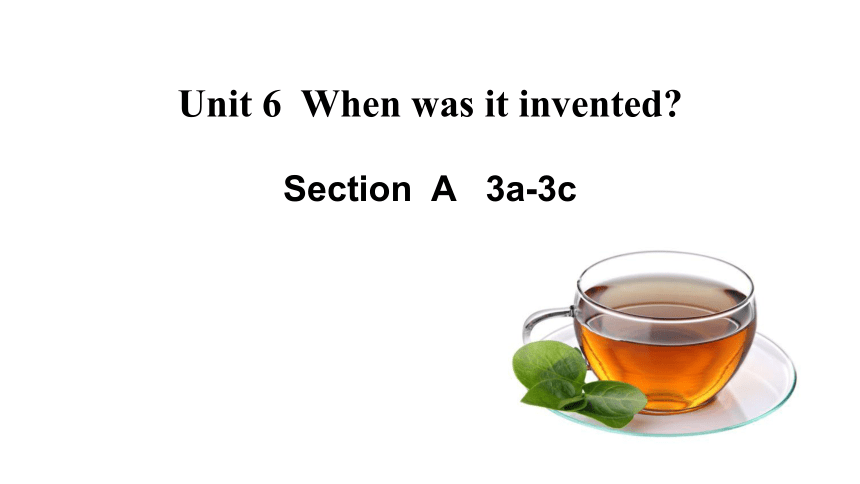 | |
| 格式 | pptx | ||
| 文件大小 | 1.4MB | ||
| 资源类型 | 教案 | ||
| 版本资源 | 人教新目标(Go for it)版 | ||
| 科目 | 英语 | ||
| 更新时间 | 2023-10-24 13:54:43 | ||
图片预览

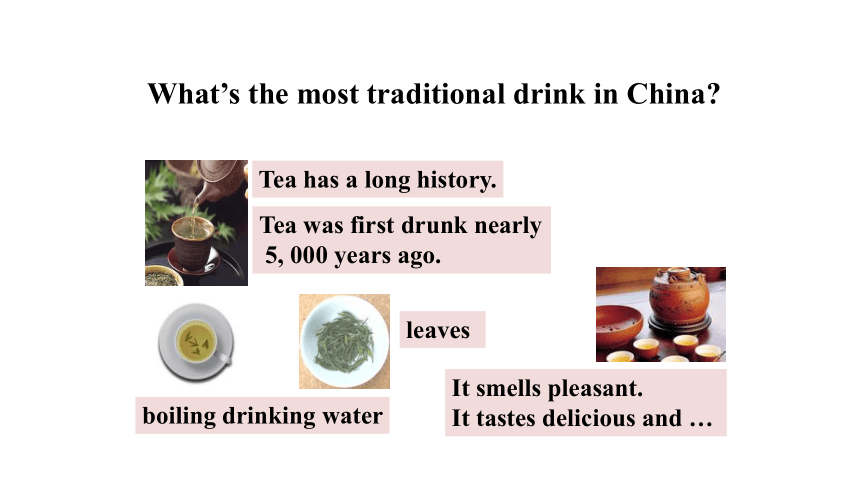
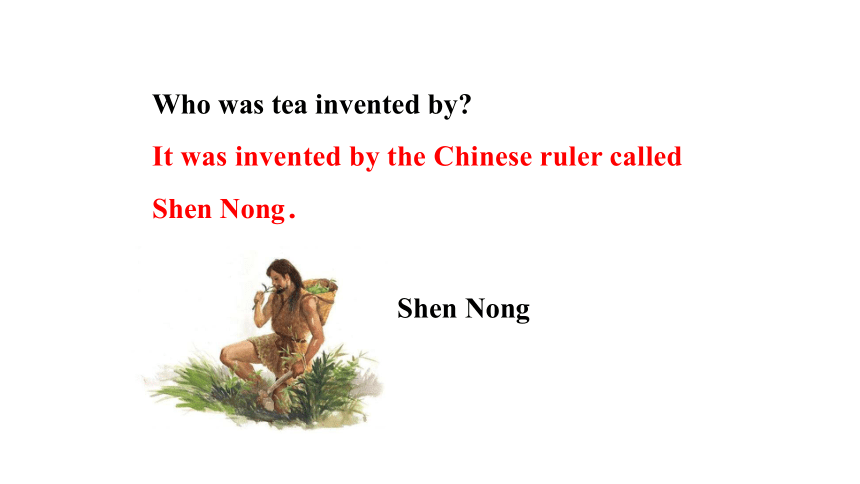
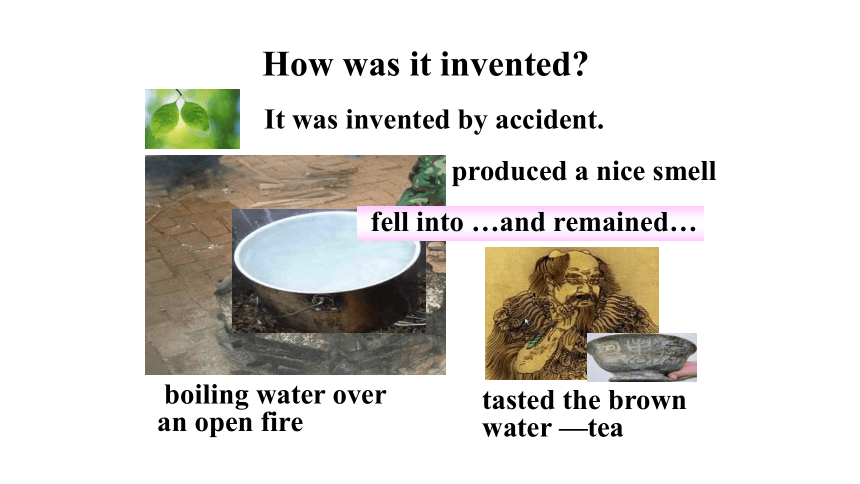
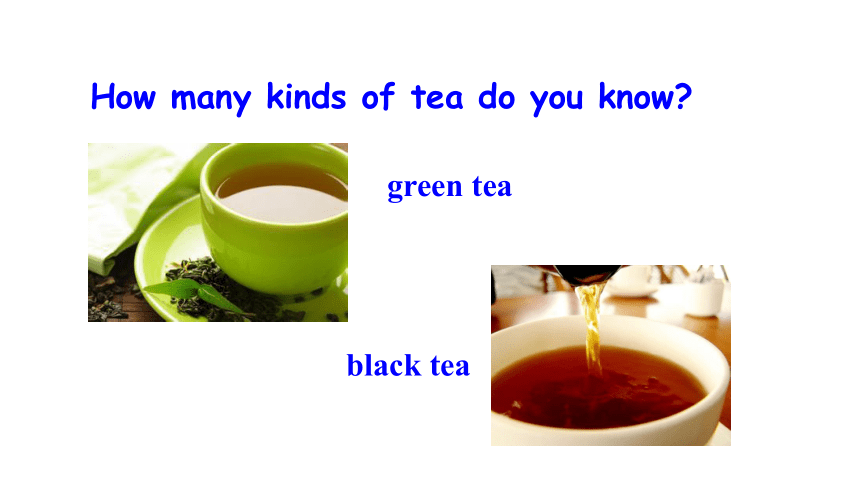
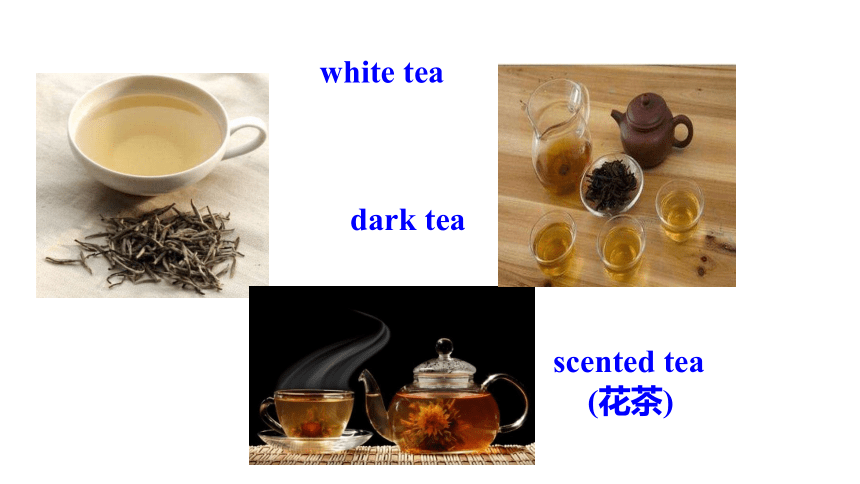
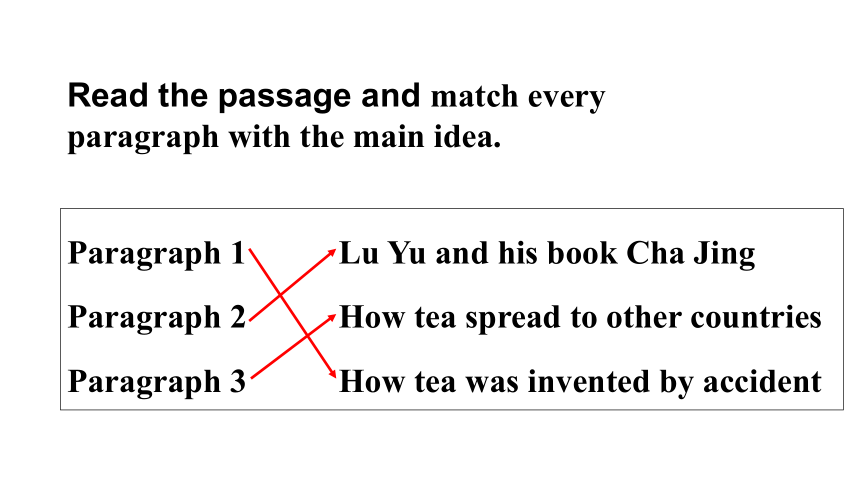
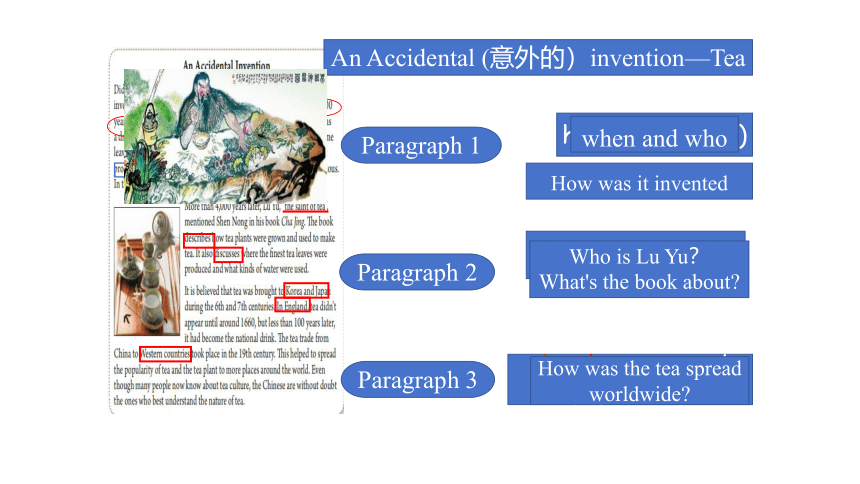
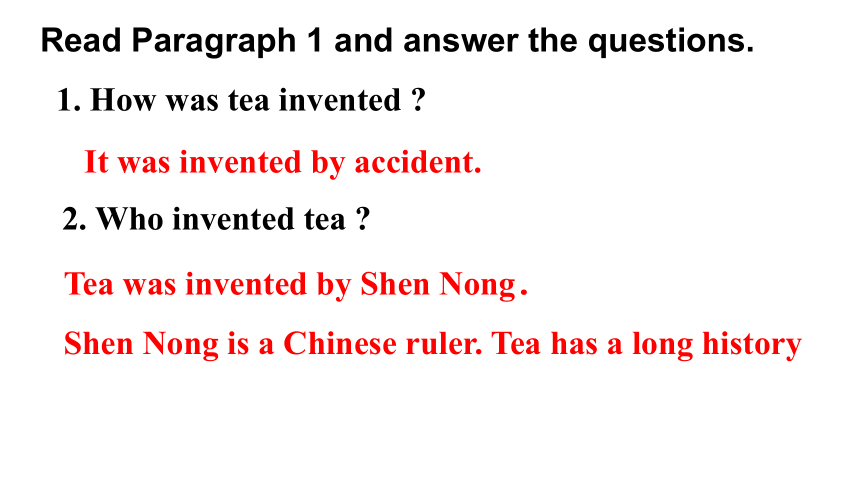
文档简介
(共28张PPT)
Unit 6 When was it invented
Section A 3a-3c
What’s the most traditional drink in China
Tea has a long history.
Tea was first drunk nearly
5, 000 years ago.
boiling drinking water
leaves
It smells pleasant.
It tastes delicious and …
Who was tea invented by
It was invented by the Chinese ruler called Shen Nong.
Shen Nong
How was it invented
boiling water over an open fire
fell into …and remained…
produced a nice smell
tasted the brown water —tea
It was invented by accident.
green tea
How many kinds of tea do you know
black tea
white tea
dark tea
scented tea
(花茶)
Read the passage and match every paragraph with the main idea.
Paragraph 1 Lu Yu and his book Cha Jing
Paragraph 2 How tea spread to other countries
Paragraph 3 How tea was invented by accident
An Accidental (意外的)invention—Tea
Paragraph 1
Paragraph 2
Paragraph 3
history(a story)
when and who
How was it invented
the origin of the tea
Who is Lu Yu?
What's the book about
development and popularity
How was the tea spread worldwide
1. How was tea invented
It was invented by accident.
Read Paragraph 1 and answer the questions.
Tea was invented by Shen Nong.
Shen Nong is a Chinese ruler. Tea has a long history
2. Who invented tea
3. How long has tea been a kind of drinks
4. When was it invented
5. What is tea used for
About 5000 years.
It was invented about 5000 years ago.
It is used for drinking.
Lu Yu, “the saint of tea”, ____________ (mention) Shen Nong in his book Cha Jing a few thousand years later. The book describes how tea plants ___________ and used to make tea. It also discusses where the finest tea leaves ______________ (produce) and what kinds of water _________ (use).
mentioned
were grown
were produced
were used
Read Paragraph 2 and fill in the blanks.
Lu Yu and Cha Jing
《茶经》,是中国乃至世界现存最早、最完整、最全面介绍茶的第一部专著,被誉为“茶叶百科全书”,由中国茶道的奠基人陆羽所著。此书是一部关于茶叶生产的历史、源流、现状、生产技术以及饮茶技艺、茶道原理的综合性论著,是一部划时代的茶学专著。它是中国古代专门论述茶叶的一部重要著作,推动了中国汉族茶文化的发展。
Read the third paragrph and complete the time line.
6th and 7th centuries
around 1660
19th century
tea was brought to Korea and Japan
tea appeared in England
the tea trade from China to Western countries took place
While-reading
While-reading
3b
Read the passage again and answer the questions.
1. When was tea first drunk
It was first drunk about 5000 years ago.
2. How was tea invented
Some leaves from a tea plant fell into some boiling drinking water over an open fire. It produced a nice smell and tasted delicious. This is how tea was invented.
3. Who is called “the saint of tea”
Lu Yu is called the saint of tea.
4. What is Cha Jing about
It describes how tea plants were grown and used to make tea.
5. When was tea brought to other countries
It was brought to Korea and Japan during the 6th and 7th centuries and to England around 1660.
Post-reading
3c
Complete the sentences with the correct forms of the verbs in the box.
invent
drink
bring
produce
trade
1. One of the world’s favorite drinks was _________ by
accident.
2. Tea was first __________ by Shen Nong 5,000 years
ago.
3. A nice smell was _________ when the tea leaves
dropped into the hot water.
4. Tea was __________to Korea and Japan during the 6th
and 7th centuries.
5. Tea is now ________ between many different countries.
invented
drunk
produced
brought
traded
1. by accident 意为“偶然;意外地”。
介词短语,在句中作状语,相当于by chance ,其反义词组为on purpose(故意地)。例句:
He got the secret by accident yesterday.
昨天他偶然得知了这个秘密。
Many important discoveries were made by accident.
很多重要的发现都是在偶然情况下发生的。
Language Points
2. It is said that a Chinese ruler called Shen Nong was the first to discover tea as a drink.
据说有一位叫作神农的中国统治者最早发现了茶可以饮用。
It is said that意为“据说……”。其中it作形式主语,真正的主语是that引导的从句。 例句:
It is said that they have found water on Mars.
据说他们在火星上发现了水。
the first to do sth. 意为“第一个做某事的人”,是“the + 序数词+to do sth.”结构,动词不定式作定语。例句:
Mary is always the first to arrive at the classroom.
玛丽总是第一个到教室。
You are the second to ask me that question.
你是第二个向我提出那个问题的人。
3. fall into:掉进;落入(圈套);陷入
“动词+介词”构成的短语,fall多用作不及物动词。例句:
He fell into the river. 他掉进河里。
The child fell into the lake and had to be pulled out.
小孩落入湖中,必须把他拉上来。
【拓展】 与fall相关的短语:
fall behind落后 fall down摔倒 fall off掉下 fall asleep入睡
4. remain作不及物动词,意为“剩下;停留;逗留”。
例句:
A few pears remain on the trees.
树上还留有几个梨。
She remained in her office all afternoon.
她整个下午都待在办公室里。
5. It is believed that…等于People believe that…,意为“人们认为/相信……”,其中it为形式主语,真正的主语是that引导的从句。例句:
It is believed that health is above wealth.
人们相信健康重于财富。
【拓展】类似的句型还有:It is said that …据说……;It is reported that…据报道……;It’s known that…众所周知……;It is supposed/thought that…人们认为……。
6. not…until… 直到……才……
主句的动词一般是非延续性动词,它所表示的动作直到until所表示的时间才发生。until可作介词,其后接表示时间的名词,也可作连词,引导时间状语从句。例句:
I read until two o’clock. 我看书一直到两点。
You can’t leave until your work is finished.
直到你的工作完成你才能离开。
7. less than意为“较少,比……少;不及,不如”。
例句:
We got there in less than two hours.
不到2个小时我们就到那儿了。
He sleeps less than seven hours every night.
他每晚的睡眠时间不到7小时。
8. take place发生;出现
常指有计划、有安排地“发生”,是不及物动词短语,不能接宾语,一般也不用作被动结构。例句:
会议将在大厅举行。
The meeting will take place in the hall.
选举每四年举行一次。
Elections take place every four years.
2) happen作“发生、碰巧”解,一般用于偶然或突
发性事件。
What happened to you 你怎么了?
Maybe something unexpected happened.
注意:happen 与 take place 通常都没有被动语态。
9. without doubt 毫无疑问;的确
He is without doubt the cleverest student I've ever taught.
他确实是我所教过的学生中最聪明的。
Without doubt this is the best.
无疑地这是最好的。
doubt n. 怀疑;疑惑 v. 怀疑;不信任;构成的短语: in doubt怀疑;拿不定主意
no / without / beyond doubt 无疑地;必定;当然
make no doubt of 对……毫不怀疑
When he read the letter, his doubts cleared away.
他读了那封信以后,心中的疑虑消除了。
He explained away her doubts.
他通过解释消除了她的怀疑。
His honesty is beyond doubt. 他的诚实毫无疑问。
Unit 6 When was it invented
Section A 3a-3c
What’s the most traditional drink in China
Tea has a long history.
Tea was first drunk nearly
5, 000 years ago.
boiling drinking water
leaves
It smells pleasant.
It tastes delicious and …
Who was tea invented by
It was invented by the Chinese ruler called Shen Nong.
Shen Nong
How was it invented
boiling water over an open fire
fell into …and remained…
produced a nice smell
tasted the brown water —tea
It was invented by accident.
green tea
How many kinds of tea do you know
black tea
white tea
dark tea
scented tea
(花茶)
Read the passage and match every paragraph with the main idea.
Paragraph 1 Lu Yu and his book Cha Jing
Paragraph 2 How tea spread to other countries
Paragraph 3 How tea was invented by accident
An Accidental (意外的)invention—Tea
Paragraph 1
Paragraph 2
Paragraph 3
history(a story)
when and who
How was it invented
the origin of the tea
Who is Lu Yu?
What's the book about
development and popularity
How was the tea spread worldwide
1. How was tea invented
It was invented by accident.
Read Paragraph 1 and answer the questions.
Tea was invented by Shen Nong.
Shen Nong is a Chinese ruler. Tea has a long history
2. Who invented tea
3. How long has tea been a kind of drinks
4. When was it invented
5. What is tea used for
About 5000 years.
It was invented about 5000 years ago.
It is used for drinking.
Lu Yu, “the saint of tea”, ____________ (mention) Shen Nong in his book Cha Jing a few thousand years later. The book describes how tea plants ___________ and used to make tea. It also discusses where the finest tea leaves ______________ (produce) and what kinds of water _________ (use).
mentioned
were grown
were produced
were used
Read Paragraph 2 and fill in the blanks.
Lu Yu and Cha Jing
《茶经》,是中国乃至世界现存最早、最完整、最全面介绍茶的第一部专著,被誉为“茶叶百科全书”,由中国茶道的奠基人陆羽所著。此书是一部关于茶叶生产的历史、源流、现状、生产技术以及饮茶技艺、茶道原理的综合性论著,是一部划时代的茶学专著。它是中国古代专门论述茶叶的一部重要著作,推动了中国汉族茶文化的发展。
Read the third paragrph and complete the time line.
6th and 7th centuries
around 1660
19th century
tea was brought to Korea and Japan
tea appeared in England
the tea trade from China to Western countries took place
While-reading
While-reading
3b
Read the passage again and answer the questions.
1. When was tea first drunk
It was first drunk about 5000 years ago.
2. How was tea invented
Some leaves from a tea plant fell into some boiling drinking water over an open fire. It produced a nice smell and tasted delicious. This is how tea was invented.
3. Who is called “the saint of tea”
Lu Yu is called the saint of tea.
4. What is Cha Jing about
It describes how tea plants were grown and used to make tea.
5. When was tea brought to other countries
It was brought to Korea and Japan during the 6th and 7th centuries and to England around 1660.
Post-reading
3c
Complete the sentences with the correct forms of the verbs in the box.
invent
drink
bring
produce
trade
1. One of the world’s favorite drinks was _________ by
accident.
2. Tea was first __________ by Shen Nong 5,000 years
ago.
3. A nice smell was _________ when the tea leaves
dropped into the hot water.
4. Tea was __________to Korea and Japan during the 6th
and 7th centuries.
5. Tea is now ________ between many different countries.
invented
drunk
produced
brought
traded
1. by accident 意为“偶然;意外地”。
介词短语,在句中作状语,相当于by chance ,其反义词组为on purpose(故意地)。例句:
He got the secret by accident yesterday.
昨天他偶然得知了这个秘密。
Many important discoveries were made by accident.
很多重要的发现都是在偶然情况下发生的。
Language Points
2. It is said that a Chinese ruler called Shen Nong was the first to discover tea as a drink.
据说有一位叫作神农的中国统治者最早发现了茶可以饮用。
It is said that意为“据说……”。其中it作形式主语,真正的主语是that引导的从句。 例句:
It is said that they have found water on Mars.
据说他们在火星上发现了水。
the first to do sth. 意为“第一个做某事的人”,是“the + 序数词+to do sth.”结构,动词不定式作定语。例句:
Mary is always the first to arrive at the classroom.
玛丽总是第一个到教室。
You are the second to ask me that question.
你是第二个向我提出那个问题的人。
3. fall into:掉进;落入(圈套);陷入
“动词+介词”构成的短语,fall多用作不及物动词。例句:
He fell into the river. 他掉进河里。
The child fell into the lake and had to be pulled out.
小孩落入湖中,必须把他拉上来。
【拓展】 与fall相关的短语:
fall behind落后 fall down摔倒 fall off掉下 fall asleep入睡
4. remain作不及物动词,意为“剩下;停留;逗留”。
例句:
A few pears remain on the trees.
树上还留有几个梨。
She remained in her office all afternoon.
她整个下午都待在办公室里。
5. It is believed that…等于People believe that…,意为“人们认为/相信……”,其中it为形式主语,真正的主语是that引导的从句。例句:
It is believed that health is above wealth.
人们相信健康重于财富。
【拓展】类似的句型还有:It is said that …据说……;It is reported that…据报道……;It’s known that…众所周知……;It is supposed/thought that…人们认为……。
6. not…until… 直到……才……
主句的动词一般是非延续性动词,它所表示的动作直到until所表示的时间才发生。until可作介词,其后接表示时间的名词,也可作连词,引导时间状语从句。例句:
I read until two o’clock. 我看书一直到两点。
You can’t leave until your work is finished.
直到你的工作完成你才能离开。
7. less than意为“较少,比……少;不及,不如”。
例句:
We got there in less than two hours.
不到2个小时我们就到那儿了。
He sleeps less than seven hours every night.
他每晚的睡眠时间不到7小时。
8. take place发生;出现
常指有计划、有安排地“发生”,是不及物动词短语,不能接宾语,一般也不用作被动结构。例句:
会议将在大厅举行。
The meeting will take place in the hall.
选举每四年举行一次。
Elections take place every four years.
2) happen作“发生、碰巧”解,一般用于偶然或突
发性事件。
What happened to you 你怎么了?
Maybe something unexpected happened.
注意:happen 与 take place 通常都没有被动语态。
9. without doubt 毫无疑问;的确
He is without doubt the cleverest student I've ever taught.
他确实是我所教过的学生中最聪明的。
Without doubt this is the best.
无疑地这是最好的。
doubt n. 怀疑;疑惑 v. 怀疑;不信任;构成的短语: in doubt怀疑;拿不定主意
no / without / beyond doubt 无疑地;必定;当然
make no doubt of 对……毫不怀疑
When he read the letter, his doubts cleared away.
他读了那封信以后,心中的疑虑消除了。
He explained away her doubts.
他通过解释消除了她的怀疑。
His honesty is beyond doubt. 他的诚实毫无疑问。
同课章节目录
- Unit 1 How can we become good learners.
- Section A
- Section B
- Unit 2 I think that mooncakes are delicious!
- Section A
- Section B
- Unit 3 Could you please tell me where the restroom
- Section A
- Section B
- Unit 4 I used to be afraid of the dark.
- Section A
- Section B
- Unit 5 What are the shirts made of?
- Section A
- Section B
- Review of Units 1-5
- Unit 6 When was it invented?
- Section A
- Section B
- Unit 7 Teenagers should be allowed to choose their
- Section A
- Section B
- Unit 8 It must belong to Carla.
- Section A
- Section B
- Unit 9 I like music that I can dance to.
- Section A
- Section B
- Unit 10 You're supposed to shake hands.
- Section A
- Section B
- Review of Units 6-10
- Unit 11 Sad movies make me cry.
- Section A
- Section B
- Unit 12 Life is full of the unexpected
- Section A
- Section B
- Unit 13 We're trying to save the earth!
- Section A
- Section B
- Unit 14 I remember meeting all of you in Grade 7.
- Section A
- Section B
- Review of Units 11-14
